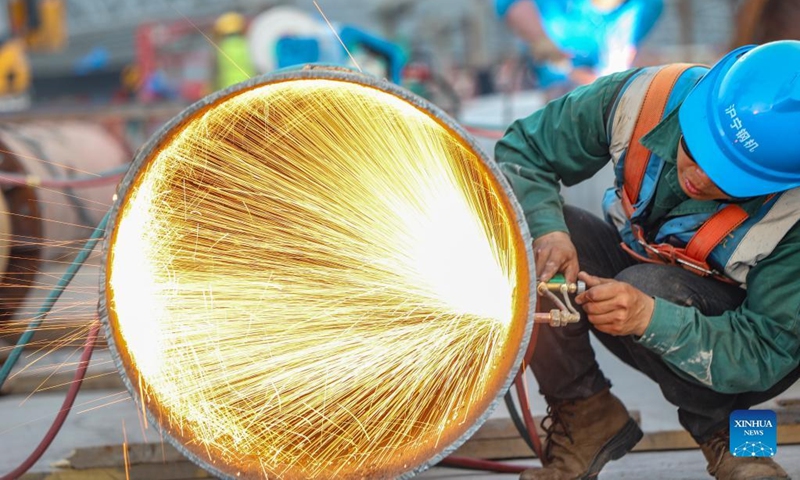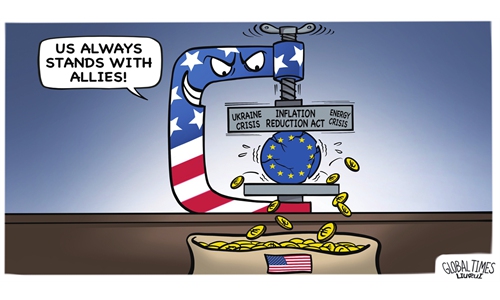China slams reported US tariffs on steel, aluminum, vows necessary measures
Official vows necessary measures to safeguard interests

A worker cuts a steel part at the construction site of the T3B terminal project of Chongqing Jiangbei International Airport in southwest China's Chongqing, July 11, 2022. Builders take shifts working for the construction of the T3B terminal project of Chongqing Jiangbei International Airport with preventing heatstroke measures in place.(Photo: Xinhua)
China’s Foreign Ministry on Tuesday expressed opposition to unilateral tariffs that violate WTO rules and vowed necessary measures to protect China’s rights and interests, as the US is reportedly pushing for an agreement with the EU on imposing additional tariffs on Chinese steel and aluminum exports.
Such a move would not only violate international trade rules but also undermine cooperation on tackling global climate change, Chinese experts warned on Tuesday. However, the move is unlikely to cause a major impact, given China’s already falling steel and aluminum exports to the US and the EU’s reluctance to join such a move.
Citing unidentified sources, Bloomberg reported on Tuesday that the US and EU may jointly impose new tariffs on Chinese steel and aluminum as part of a bid to fight carbon emissions and global overcapacity.
US Trade Representative Katherine Tai and her team presented the idea to the EU side in late October, when EU officials raised questions over the legality and compatibility with WTO rules as well as the bloc’s internal carbon pricing mechanism. An agreement between the US and the EU may be unlikely until 2023 at the earliest, the report said.
Asked about the report at a regular press briefing on Tuesday, Mao Ning, a spokesperson for the Chinese Foreign Ministry, said that she was not aware of the specific reports.
“So I would just like to say broadly in principle that China is against unilateral tariffs that violate WTO rules, which serve no one’s interest. We will take all measures necessary to defend our legitimate rights and interests,” Mao said.
Chinese industry analysts noted that the move, if it materializes, will impact China’s relevant exports, but the impact won’t be too big.
“While additional tariffs will hamper China’s steel and aluminum exports, the country’s export volume has been so low that the impact would be slight,” Wang Guoqing, research director with the Beijing Lange Steel Information Research Center, told the Global Times on Tuesday.
In addition, China has large domestic demand with the stable recovery of the economy and the country could also diversify its export markets, according to Wang.
China’s steel and aluminum exports to the US slumped in recent years due to mounting trade remedy investigations and additional tariffs. According to data from the Beijing Lange Steel Information Research Center, China exported 853,700 tons of steel to the US in 2021, a significant drop compared with 3.4 million tons in 2014. Exports of aluminum oxide to the US fell from 5,311 tons in 2014 to 1,730 tons last year.
“Rather than targeting China’s steel and aluminum, the proposed idea is more like a political trick that aims to showcase solidarity between the US and the EU,” Gao Lingyun, an expert at the Chinese Academy of Social Sciences in Beijing, told the Global Times on Tuesday.
Adopting tools that are usually used in trade conflicts for its climate agenda, the US sets a bad example as it risks extending China-US trade conflicts to involve the EU, which does harm to multilateralism and worsens the sluggish world economy, according to Gao.
However, the EU may echo the US’ move in words but is unlikely take action, as the US might pressure the EU to side with it in other agendas with the threat of additional tariffs on the EU’s steel and aluminum, Gao said.
The US, under former president Donald Trump, imposed punitive tariffs on EU steel and aluminum exports, though the two sides reportedly reached a deal to end the tariffs just last year.
Meanwhile, there are growing trade tension between the US and the EU. Just a few days ago, French President Emmanuel Macron pushed back over the US Inflation Reduction Act in Washington, saying that it would have negative repercussions for Europe by making it less attractive for companies to invest in the US and risks “fragmenting the west,” the Financial Times reported.
Moreover, the US’ move is a clear departure from its recently reaffirmed commitment to cooperate with China to address global climate change and other challenges, analysts noted.
“The Biden administration’s move violates world leaders’ commitment at the G20 summit for peaceful resolution of conflicts and cooperation in tackling climate change. The move poses an obstacle for future climate change cooperation among countries,” Wang Peng, a research fellow at the Beijing Academy of Social Sciences, told the Global Times.
As the world’s largest economies, the US and China have a responsibility to join hands to make a greater contribution to tackling climate change, Wang Peng said, urging the US to drop its plan and return to the normal track of cooperation with China.
The two sides could deepen cooperation in a wide range of areas, including the formulation of international standards and the research and development and application of new technologies such as wind power and solar power, according to Wang Peng.

